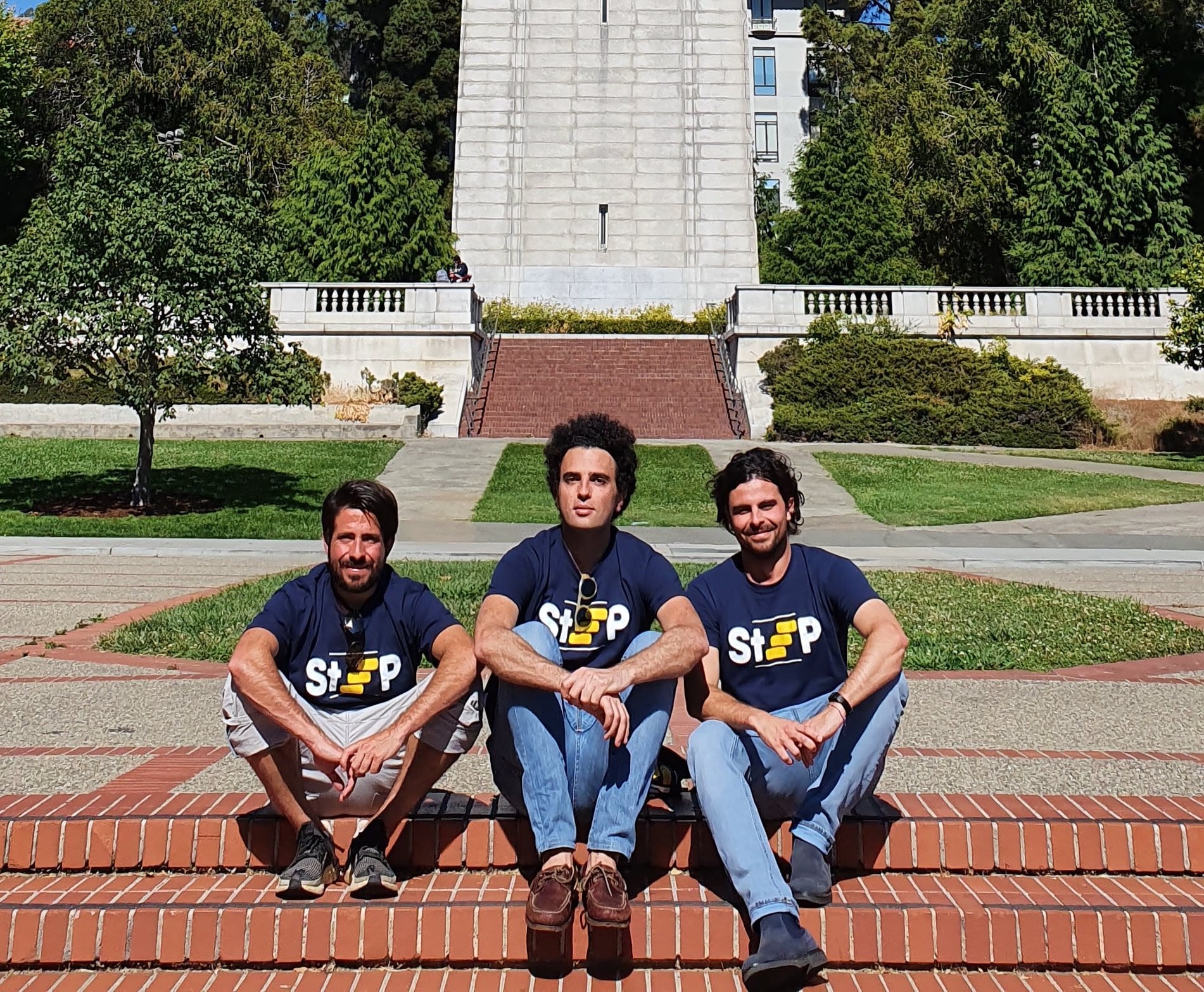
When Santiago Pezzoni isn’t in his Berkeley Haas MBA classes, he’s running his fintech startup, Digiventures.
And when he’s not running Digiventures, he’s helping other UC Berkeley students start their own companies as co-founder and program manager of StEP (Student Entrepreneurship Program), a 10-week campus-wide incubator that has so far assisted 120 startups.
“There are so many people on campus—PhDs, postdocs, engineers—who have fantastic ideas and technologies, but you ask them ‘how will you make that a business?’ and they say, ‘I’m not sure,’” said Pezzoni, MBA 21, who co-founded StEP with Santiago Freyria and Francesco Dipierro, both MBA 20. “We’re figuring out how to get them involved and help them take their fantastic ideas into the world.”
Launched in 2019, StEP is a cross-collaboration among Berkeley student clubs, faculty, entrepreneurship organizations, and VCs. It aims to fill a gap the founders discovered in the campus startup ecosystem.
“Our research found that while more than 80% of Haas students we interviewed took entrepreneurship classes or had startup ideas, less than 5% were able to access accelerators or pre-seed funding,” Pezzoni said.
“Our research found that while more than 80% of Haas students we interviewed took entrepreneurship classes or had startup ideas, less than 5% were able to access accelerators or pre-seed funding.” — Santiago Pezzoni.
Berkeley students, faculty or alumni can apply to StEP as teams or individuals, and opt to be matched with others. All of the teams meet on Zoom weekly, using skills they learn in StEP to take their ideas forward. They also meet separately each week with mentors to review goals and achievements. At the end of the program, teams pitch their startup plans to investors.
StEP applicants choose one of two paths, depending on whether they are looking for help with an idea or want to be matched with others who already have an idea. The program’s founders reach across programs and schools to find people with the right skill sets needed by the new teams. Later, the founders work to connect the teams with investors who can provide early-stage capital.
“You only do it if you really love this”
So far, 120 startups have completed the StEP program, and 30% of them still exist. About a quarter of participants are from Haas, including Dispatch Goods, founded by Lindsey Hoell, who was last year’s StEP showcase winner and is now growing her company at UC Berkeley SkyDeck, a partnership among Haas, Berkeley Engineering, and the Office of the Vice Chancellor for Research.
Pezzoni, who won the LAUNCH program last year with Digiventures, said StEP helps students to clarify whether the startup life is for them. “Being an entrepreneur is not a sexy life,” he said. “It’s tough, and you only do it if you really love this. You have to decide why you want to be a founder.”
“Being an entrepreneur is not a sexy life,” he said. “It’s tough, and you only do it if you really love this. You have to decide why you want to be a founder.”
StEP’s founders say they work about 20 hours a week apiece on the program, chatting often with startup stakeholders across campus including Rhonda Shrader, executive director of the Berkeley Haas Entrepreneurship Program (BHEP), Caroline Winnett, executive director of Berkeley SkyDeck, and former Haas Dean Rich Lyons, now UC Berkeley’s Chief Innovation and Entrepreneurship Officer, who supported StEP from its inception.
Moving through the startup ecosystem
The typical trajectory for new startup teams is to start with a program like StEP and continue with a Berkeley program like NSF I-Corps , CITRIS Foundry, Form+Fund, and then, with that experience under their belts, apply to the LAUNCH incubator program. María del Mar Londoño, MBA 21, founder of SuperPetfoods, won the StEP finals two years ago and continued on to the LAUNCH finals. StEP co-founder Freyria also went through LAUNCH as a co-founder of Callisto Spirits, a botanical rum maker that raised $650,000.
Bernardo Magnani, MBA 21, who is part of the StEP leadership team, left a consulting career to co-found Lastbit, and was accepted to the prestigious Y Combinator startup accelerator program. Magnani just raised $2 million for the company, which allows customers to make instant low-cost global Bitcoin payments.
“I’m such a fan of StEP,” Shrader said. “Sometimes the hardest part of entrepreneurship is just finding a teammate or asking a bunch of questions with people who are all learning together. StEP is just a beautiful resource for the campus—designed and delivered by students.”
The passion to keep building the program unites the StEP team, Dipierro said.
“We’re working to build something that will continue, that can be sustainable at UC Berkeley for the next 10 years,” he said.